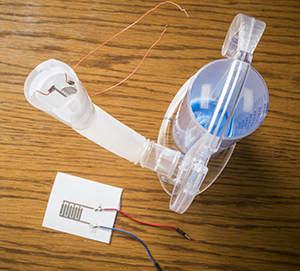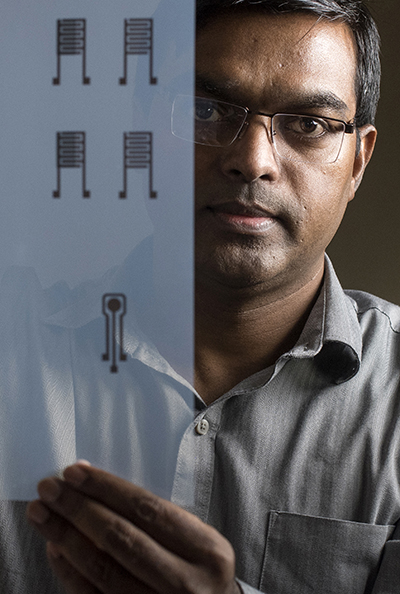Mohammad Haider, Ph.D., an associate professor in the UAB Department of Electrical and Computer Engineering, recently received a three-year award from the National Science Foundation (NSF) worth nearly $500,000 to continue work toward developing a machine learning platform on a flexible substrate for next-generation personal protective equipment (PPE).
The project, titled “Wireless Edge-Computing Personal Protective Equipment for Large-Scale Health Monitoring” (WEPPE), is a continuation of research Haider began with an earlier NSF grant and internal support from the School of Engineering that funded the development of a method of printing sophisticated, flexible circuits using a common office inkjet printer. At that time, Haider cited a need for a better technological infrastructure to support the massive amounts of data being produced by the growing array of connected “smart” devices, commonly referred to as the “Internet of Things.” In the years since, his concerns have been validated, as the Covid-19 pandemic exposed flaws in the existing infrastructure.
“The pandemic exposed a need for better tracking of the spread of transmittable diseases over large areas,” Haider said. “To do that, we need a general purpose, scalable edge-computing architecture to support the next generation of PPE.”
The challenge, Haider explains, stems from too much of a good thing. Specifically, too much data is being trafficked through an insufficient infrastructure. “Over the past decade, there has been a huge increase in high-volume data generation, thanks to the proliferation of sensors and wireless sensor networks.” Haider said. “This increases the computational burden at the central data center, creates data transmission bottlenecks, and hinders the real-time decision-making process. These challenges arise due to the existing limits of IoT devices on computational power, memory, and wireless bandwidth allocation.”
 To address those problems, WEPPE includes four research goals:
To address those problems, WEPPE includes four research goals:
- Research on Reservoir Computing Architectures for Sensor Network Analysis,
- Research on Inkjet-Printed Devices for Sensing and Physical Computing,
- Investigate Energy-Efficient Orthogonal Pulses and Multi-bit Data Mapping, and
- Research on Orthogonal Analog Pulse Based Data Compression and Decompression
Those goals will be pursued in two distinct phases. “The first phase will investigate a low-cost inkjet-printable nonlinear-element and develop a machine-learning platform on a flexible substrate for low-level sensor data processing or in-situ computation,” Haider said. “In the second phase, the project will integrate an efficient analog pulse-based data encoding and decoding scheme to wirelessly relay the processed sensor data from the first phase to a data center without requiring extended network bandwidth.”
“Ultimately, we expect to produce a unique machine-learning framework that hinges on the fundamentals of reservoir computing, novel inkjet-printed sensors, and nonlinear elements, and wireless data telemetry scheme with secure communication,” Haider said.
